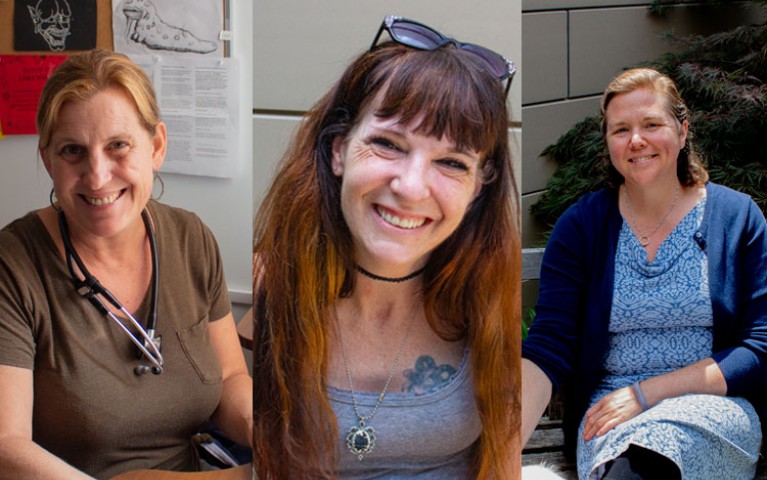Saving Yourself Starts with Welcoming MAT

This story originally appeared in our Summer 2019 Edition of News from HOME.
“It’s not like I got high and then I’m here,” says Lisa as she sits in the comfort of Project HOME’s Stephen Klein Wellness Center (SKWC). “There's just whole decades of hurt and struggle.” Lisa has been visiting SKWC for the last seven months to receive her Suboxone, a medication that helps her with her opioid dependency, but that’s not all she’s been receiving from the Center. “They actually call me to make sure I'm going to come in, you know, see how I'm doing.”
Lisa is part of a program called Medication Assisted Treatment (MAT) that has been offered at SKWC since 2016. In 2017, PA Center of Excellence (COE) status was awarded to Pathways to Housing PA, Project HOME Healthcare Services and Prevention Point Philadelphia to allow Medication Assisted Treatment of opioid use disorder.
MAT is designed to combine behavioral therapy with medication to treat substance use disorder. In the beginning, only two doctors could provide this treatment at SKWC, which limited them to thirty patients each. Since weekly individual appointments were not possible at this number, the Center began offering group sessions. “It's a way for a group of eight to ten folks to get behavioral health support, to get peer support, and it allows more people access to care,” says Dr. Lara Weinstein, one of the doctors in the MAT program. Peer support or “group” as it’s been dubbed, also offers accountability, explains Dr. Weinstein, and can remove some of the stigma attached with substance use disorder when everyone is coming from a similar place. The program has grown so much that SKWC now offers group sessions four times a week with about six providers who can prescribe medication. They also partner with Pathways to Housing (a Housing First provider) and the City of Philadelphia to provide MAT on site at Pathways for their two opioid use disorder-specific teams.
The expansion of the MAT program is critical as the City and the nation faces the greatest public health crisis in a century, that of opioid use disorder and overdose. In 2018, of the 1,116 overdoses, more than 900 of them were due to opioids. As part of an overall strategy to combat the opioid crisis, Project HOME will expand MAT beyond the SKWC to our Hub of Hope engagement center and our newly opened Sacred Heart Recovery Residence. All of Project HOME’s permanent supportive housing offers recovery, including the new Maguire Residence in Kensington. In addition, a new residence currently in development, Kensington Long-Term Recovery Residence, will also focus on recovery and offer the MAT program.
Expanding the MAT program helps with another goal, according to Robin DeBates, Program Manager of SKWC’s Center of Excellence: making help easier to get than heroin. And, that help doesn’t go away when a patient relapses - which has happened to Lisa – and to numerous others. “Had I been anywhere else, those seven months when I was coming here and struggling,” Lisa says, “God knows what would have happened to me because I would have probably been put off the program.” DeBates says at SKWC they use slips and relapses as an indicator that they need to increase engagement, because connection is essential to recovery. "Trauma and addiction are really pretty fundamentally about disconnection, and the more that we can help people build and rebuild connection, I think that's what's most helpful and most healing.”
Thanks to the treatment, her support group and her hard work, Lisa now has a job, her driver’s license, and the longest period of being clean in her life. Her son stays with her when he’s not at boarding school, where Lisa put him for his own safety. She is trying to put her life back together, one small piece at a time and one day at a time. “I have to work on looking in the mirror and looking myself in the eye and saying, ‘I forgive you; I like you; it’s okay to be who you are.’”
Including Lisa’s success story, Dr. Weinstein says the program and its philosophy are working. For at least the first three months, about 80% of the one hundred-plus participants in the MAT program stay in the program – a high rate for this kind of treatment. “We're trying to meet people where they are, we don't judge them for showing signs of the disease that they're asking us to help them with.” That is what Lisa feels when she shows up for “group” each week. “The people that work here, they’re special people. They're not here for a job, it's a life calling, because to work with people like us, we can be difficult, we can be hard to love, and it's hard to watch people come in that you care for, hurting themselves. I know that it's hard for them to watch us, but they saved my life.”